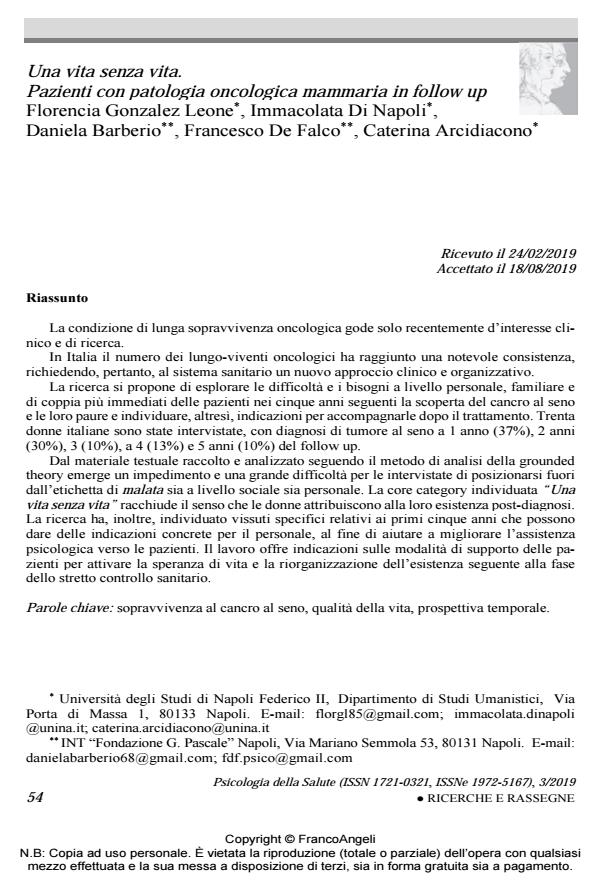A life without life. Patients with breast cancer in follow up
Journal title PSICOLOGIA DELLA SALUTE
Author/s Florencia Gonzalez Leone, Immacolata Di Napoli, Daniela Barberio, Francesco De Falco, Caterina Arcidiacono
Publishing Year 2019 Issue 2019/3
Language Italian Pages 23 P. 54-76 File size 334 KB
DOI 10.3280/PDS2019-003004
DOI is like a bar code for intellectual property: to have more infomation
click here
Below, you can see the article first page
If you want to buy this article in PDF format, you can do it, following the instructions to buy download credits

FrancoAngeli is member of Publishers International Linking Association, Inc (PILA), a not-for-profit association which run the CrossRef service enabling links to and from online scholarly content.
Long survival oncology patients have only recently become of interest in the field of clini-cal intervention and research. In Italy there are a considerable number of these individuals, requiring a new clinical and organizational approach to the health system. The research aims to explore patients’ difficulties and needs on personal, family and cou-ple levels in the five years following the diagnosis of breast cancer and also to identify rec-ommendations to support them after treatment. Thirty Italian women, who had been diagnosed with breast cancer, were interviewed at 1 year (37%), 2 years (30%), 3 (10%), 4 (13%) and 5 years (10%) after follow up. From the textual material collected and analyzed according to the grounded theory ap-proach, it emerges an impediment and great difficulty for the interviewees to position them-selves out of the image of sickness, both socially and personally. The core category "A life without life" provides a good explanation of the sense that women attribute to their life after diagnosis. The research has also identified specific experiences of the first five years that give concrete indications for health professionals, in order to improve psychological assistance to patients. Furthermore, the research offers indications on how to support patients in reorganizing their lives and improving their life expectancy, following the phase of health checkups.
Keywords: Bbreast cancer survivors, quality of life, temporal perspective.
- Psychological Lockdown Experiences: Downtime or an Unexpected Time for Being? Fortuna Procentese, Ciro Esposito, Florencia Gonzalez Leone, Barbara Agueli, Caterina Arcidiacono, Maria Francesca Freda, Immacolata Di Napoli, in Frontiers in Psychology 577089/2021
DOI: 10.3389/fpsyg.2021.577089
Florencia Gonzalez Leone, Immacolata Di Napoli, Daniela Barberio, Francesco De Falco, Caterina Arcidiacono, Una vita senza vita. Pazienti con patologia oncologica mammaria in follow up in "PSICOLOGIA DELLA SALUTE" 3/2019, pp 54-76, DOI: 10.3280/PDS2019-003004